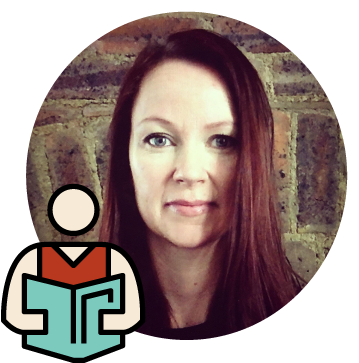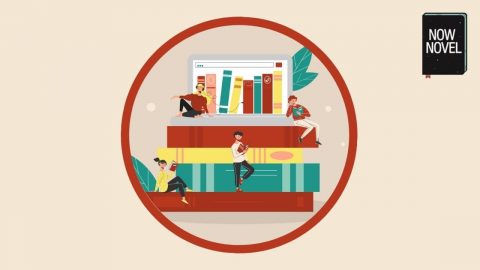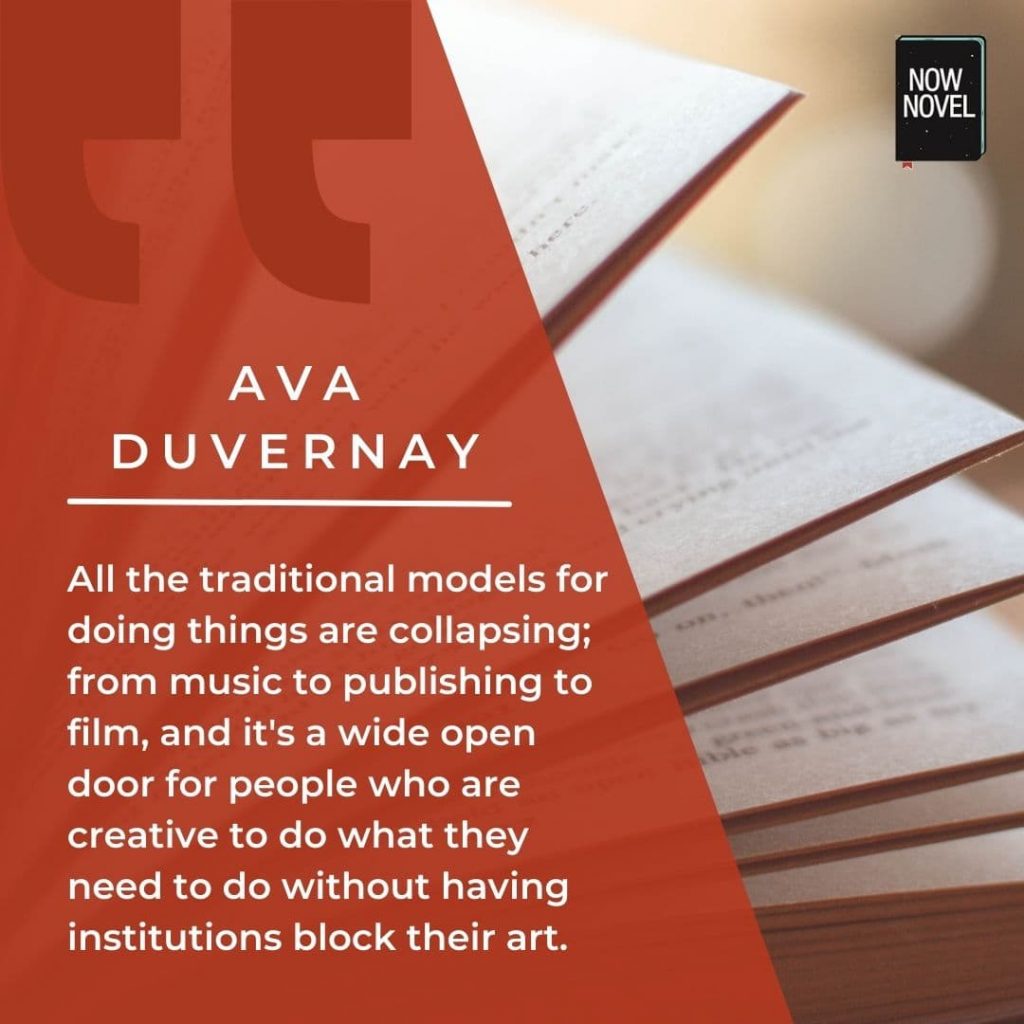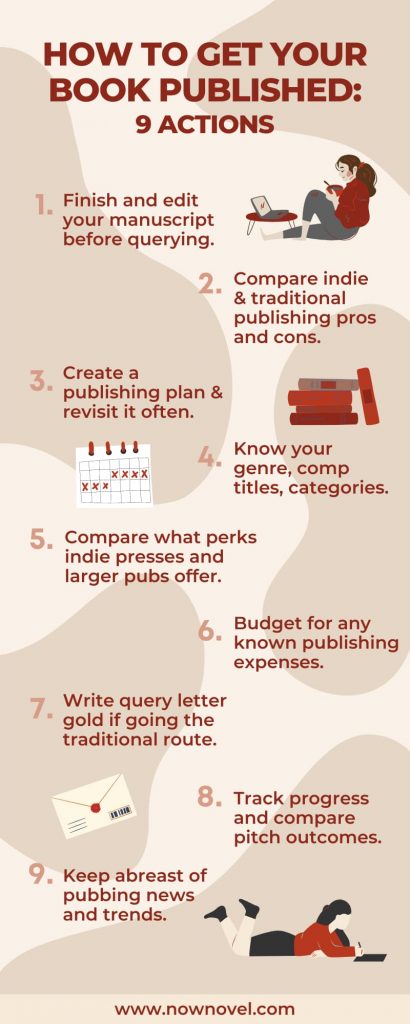Wondering how to get a book published for the first time? Read on for advice on preparing to publish. Find information on indie vs traditional publishing, choosing between smaller and larger publishing companies, and more. In today’s world there are many publishing options.
How to get your book published
- Finish and edit your manuscript
- Choose between the indie and the traditional publishing route
- Create a publishing plan
- Know your genre, comp book titles, categories
- Compare small presses and larger publisher pros
- Budget publishing expenses if going indie
- Write query letter gold for traditional publishing
- Track progress and compare outcomes
- Read publishing trade journals and magazines
Let’s dive in:
1. Finish and edit your manuscript
Before you begin querying or invest in cover design, it is wise to finish and edit your entire manuscript.
Why? Agents and publishers often want to see the first three chapters, don’t they? You may get a partial manuscript request when querying, but what if you received a full manuscript request? This could create pressure to finish quickly. A rush job wouldn’t show your story in its best light.
Give yourself the time to truly finish and polish your manuscript, get it ‘book ready’ first. Look at hiring professional editors, perhaps. While your MS is under consideration (if going the trad publishing route), you could also begin a new project.
As part of this process you might also want to ask beta readers (or a critique partner) to review your work. This will be useful for helping in polishing your manuscript as well. Beta readers will see the plot holes you didn’t, or help you to see that a character needs more development and so on. There are a number of ways to get beta readers. You could join writers social media groups. You could ask fellow Now Novel members for help in doing so as well. And, of course, offer to act as a beta reader for other authors.
Another step in the publishing process is determining your genre, which is covered in depth below.
At this point it’s also important to be able to summarize your entire book in a sentence or two. This is useful when you’re pitching and/or marketing your book.
2. Choose between indie and traditional publishers
Today you don’t need to ‘get’ your book published – the truth is that it’s easier than ever to become an indie author (or a self-published author). This may be the publishing path for you, if you’d prefer total executive control over your book and royalties. This holds true for all genres, from literary fiction to science fiction, for example.
What are the pros and cons of indie vs the traditional publishing process?
Indie publishing pros
- Higher profit share to author
- Shorter time to market
- No gatekeeping
- Full executive control
- You control your pub. rights
Trad. publishing pros
- Higher prestige or clout
- Industry know-how
- In-house editing and design
- Greater visibility/reach
- Don’t have to do it all yourself
Indie publishing cons
- You foot upfront costs, which could amount to thousands of dollars
- No guaranteed quality control
- High competition
- More admin for you
Trad. publishing cons
- Contractual obligations
- Higher barriers to entry
- Less creative control
- Publisher controls rights
If you want to compare indie publishing to traditional publishing further, Joanna Penn’s guide to traditional vs indie publishing is excellent. Read another guide to the pros and cons of self-publishing on our blog too.

Prepare to launch your book
Join a course led by multi-published authors and learn how to publish and promote your book..
Learn more3. Create a publishing plan
Publishing is a many-sided process. Formatting and cover design. Pre- and post-launch book promo. If you wrote your book with a specific market in mind, you may already even have laid some of the groundwork.
We have written about business plans for authors previoulsy. How important it is to:
- Have SMART (specific, measurable, attainable, realistic and time-based) goals
- Know your anticipated costs upfront
- Create a compelling author brand
The same applies for publishing. If you’re thinking of the indie publishing path, you’ll need a story or developmental edit, copy-edit and proofreading (if you want a polished end-result that can compete with traditionally published books). You will also be in charge of your book launch, finding a suitable venue (or book store), finding a discussant to be in conversation with you about your book, and so on.
In the 100th edition of Writer’s Market, Sophia McDonald Bennett writes:
Once you’ve wrapped up your [writing] business planning process, don’t put the resulting document away in a drawer. Revisit it on a regular basis to remind yourself of your vision and goals and revel in your progress.
Sophia McDonald Bennett, ‘Why Every Writer Needs a Business Plan’ in Writer’s Market 100th Edition: The Most Trusted Guide to Getting Published (November 2021)
Romy runs through some of the requirements you need upfront for indie publishing in the video below. These include cover design and ARCs (advanced review copies):
4. Know your genre, comp titles and categories
If you want to get published, it’s crucial that you know your genre well. You need to be able to reference comp titles (books that are similar in genre and target audience), and know which categories (and sub-categories) your writing belongs to. The publishing industry distinguishes between different genres, between nonfiction and fiction and so on. So it’s best to pay close attention to these categories.
The greater your fluency in the language of your genre, the more your querying content (or book blurbs, if going indie) will represent your story’s merits well.
Spend some time just browsing the genre and subgenre categories on Amazon, B&N and other book marketplaces.
Choose realistic, relevant, recent comp book titles
When you’re writing a query letter to send agents (more on this below), it’s useful to think carefully about comparison (comp) titles. Comparison titles are books that are similar to yours in genre, subject matter and themes.
This applies to when you are going with a traditional publishing house (though it is still useful to be able to compare an indie title to other successful titles, too – for writing persuasive PR, for example).
The reason you mention comp titles in a query letter is two-fold: Firstly, agents and publishers see you know your genre (and what is marketable within it). Secondly, comp titles suggest a comparable, potential sales trajectory based on similar work that has sold well.
Reference comparison titles that are:
- Not so obscure that the person you’re pitching is unlikely to have heard of them
- Not so famous or chart-topping that the comparison seems a huge reach
- Illustrative of what your book is, and how the agent or editor reading your pitch could sell it
Agent Jacqui Lipton gives good advice for choosing comp titles.
Understand book categories and subcategories
This is important if you are going the indie publishing route. Your category and keyword choices when listing your book on a platform such as Amazon can make or break discoverability.
Amazon’s Kindle Direct Publishing knowledge base offers a succinct guide to choosing categories. You’ll also find links to browse book categories by global Kindle stores. KDP also created a brief explainer video that is helpful for beginners:
5. Compare small presses and larger publisher pros
If you’re asking how to get published, you may have thought of getting published by one of the major book publishers (or their imprints):
- Penguin Random House
- HarperCollins Publishers
- Hachette Book Group
- Macmillan
- Simon & Schuster
Bear in mind that many large presses mostly deal only through literary agents, so you may need to get a literary agent before if going this route. Make a list of agents and you can then query them.
Good news if you’re considering publishing a nonfiction book is that it is possible to sell it even if you haven’t written the whole book. This is where a rock solid book proposal will stand you in good stead.
Yet what about small or indie presses? These may be smaller companies without as much cultural cachet or public recognition. However, as Booker-nominated author Karen Jennings told us, going with a smaller publisher can mean having people who are both passionate about your book and have more time to devote to it.
What are the pros of publishing with small vs larger publishers?
Small/indie presses
- Some accept unsolicited submissions
- Smaller author rosters may mean more focus/support for you
- May prove a bridge to acquisition by a larger publisher
- May take chances on new authors
Large publishers
- Clout and prestige
- May offer larger advances
- Wider print distribution
- Could provide more design budget
- More assistance with marketing and promotion
Something to keep in mind is that if you opt for a smaller press, you may be able to pitch the publisher directly. Larger, major publishers almost always require a literary agent, which adds another step to the process of getting published (finding an agent).
Always check submission guidelines of agents.
Some indie presses also run publishing contests for unpublished authors. For example, Sarah Isaacs won the inaugural Island Prize, offered by indie publisher Holland House in partnership with Karavan Press.
We previously interviewed Now Novel member Fil Reid about winning Dragonblade Publishing’s historical romance contest which led to the publication of the first novel in her Guinevere series.
6. Budget publishing expenses if going indie
If you choose the indie route, while you may have higher earning potential, you’ll also have to pay upfront costs. Keep a budget and track your publishing expenses. Depending on your own skill set, these may include:
- Multiple rounds of editing
- Book cover design
- Formatting and typesetting
- Book marketing
To save on expenses, you may want to invest time in learning to use formatting tools such as Vellum.
If you’re concerned about expenses, you may be able to cut some corners. You could also crowdsource funding for your book, or investigate grants open to unpublished authors (Writer’s Market’s publishing guide lists several grant sources).
Reedsy offers a succinct guide to cover design, including different design styles and how to brief book cover designers.
7. Write query letter gold for traditional publishing
If you’ve decided you want to learn how to get published the traditional route, first:
- Steel yourself for rejections: It’s virtually unheard of to land a publishing contract off an author’s first pitch
- Put time into writing a compelling, persuasive query letter in the correct format
Writer’s Market linked above has extremely helpful template query letters, dissecting the essential parts of a cover letter. We’ve also written a guide to query letters that covers the basics.
When querying agents (or publishers that accept unagented submissions), remember to:
- Address the specific editor or agent and keep your tone professional
- Begin by mentioning length and title and broad terms describing key genre elements – the length should be correct for your genre/format
- Give a quick summary that conveys core conflicts and triggers that would draw an emotional reader response
- Include succinct reference to comp titles that are neither too obscure nor the go-to, obvious bestseller references.
Things to avoid in your query letter
Writer’s Market lists several things to avoid in a query letter to any agent or editor. Avoid:
- Unchecked excitement or hyperbole (such as ‘This story is amazing’ – keep language neutral and be able to back up any claims)
- Initiating discussion of pay rates – this comes later
- Including copyright symbols or saying your work is copyrighted – this will be understood by an industry professional
- Flattery or language that could be construed as manipulative – the work should stand on its own merits
For examples of query letters with detailed feedback, see agent Janet Reid’s blog Query Shark where she gives line-level feedback to querying authors.
8. Track progress and compare outcomes
If you’re querying agents, it’s a good idea to keep a spreadsheet of who you’ve queried, what the response was (if there was a response), and who you’ve sent what.
If you’re going the indie route, keep a spreadsheet of who you’ve briefed what, what ETAs are in place for the various moving parts of your book such as proofs or your cover.
Project management tools such as Trello are useful (we use it ourselves) as they have checklists, color-coding and other features that make it easy to see at a glance what action items in your publishing plan are complete and what you need to do next.
9. Read publishing trade journals and magazines
If you’re serious about getting your book out and learning how to get published, there are many helpful industry resources. Publisher’s Weekly is a great resource for keeping abreast of global publishing news, weekly news on recent book deals signed, and more.
Keeping abreast of publishing trends and news will help you gain a sense of the market over time. Pitch angles that could count in your favor, too.
The Science Fiction and Fantasy Writers of America offer several helpful resources. For example, this guide to avoiding vanity publishing scams and exploitative publishing contracts. Also read what Now Novel social media followers have said about vanity publishing.
While we haven’t covered this in detail, let’s briefly mention hybrid publishing. This is when the author carries the cost and financial risk. However hybrid publishers will assume the responsibility for design and layout, for instance. Quality varies between hybrid publishers, so it’s worth doing your research, and comparing the quality of book titles from hybrid publishers, if that is the route you want to pursue.
Want to learn how to get published and avoid rookie mistakes? Join How to Publish and Promote Your Novel, a 5-month publishing course that will guide you through every aspect of preparing to launch your book.



